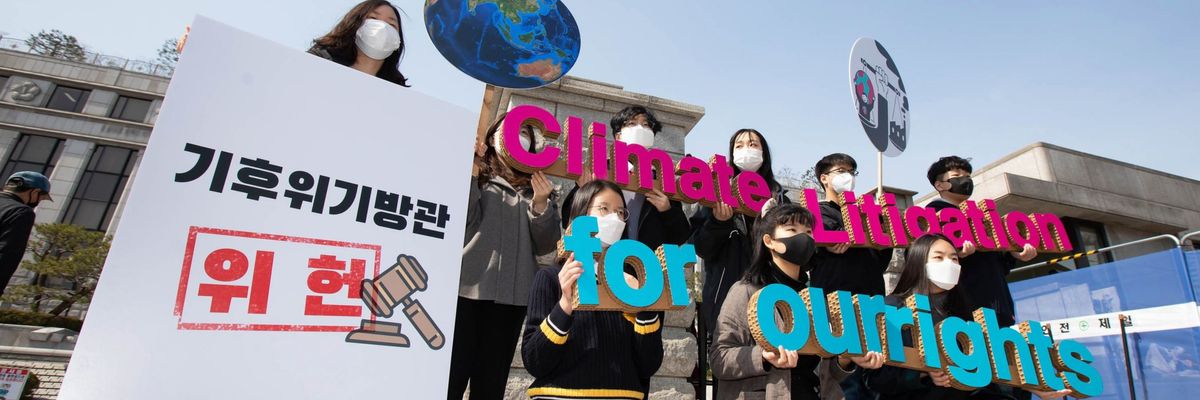One of South Korea's two highest courts on Tuesday began hearing Asia's first-ever youth-led climate lawsuit, which accuses the country's government of failing to protect citizens from the effects of the worsening, human-caused planetary emergency.
Nineteen members of the advocacy group Youth4ClimateAction filed a constitutional complaint in March 2020 accusing the South Korean government of violating their rights to life, the "pursuit of happiness," a "healthy and pleasant environment," and to "resist against human extinction."
The lawsuit also notes "the inequality between the adult generation who can enjoy the relatively pleasant environment and the youth generation who must face a potential disaster from climate change," as well as the government's obligation to prevent and protect citizens from environmental disasters.
"South Korea's current climate plans are not sufficient to keep the temperature increase within 1.5°C, thus violating the state's obligation to protect fundamental rights," the plaintiffs said in a statement.
Signatories to the 2015 Paris agreement committed to "holding the increase in global average temperature to well below 2°C above preindustrial levels and pursuing efforts to limit the temperature increase to 1.5°C."
According to the United Nations Environment Program's (UNEP) most recent Emissions Gap Report, the world must slash greenhouse gas emissions by 28% before 2030 to limit warming to 2°C above preindustrial levels and 42% to halt warming at 1.5°C. UNEP said that based on current policies and practices, the world is on track for 2.9°C of warming by the end of the century.
A summary of the lawsuit notes that South Korea is the fifth-largest greenhouse gas (GHG) emitter among Organization for Economic Cooperation and Development nations, and that the government is constitutionally obligated to protect Koreans from the climate emergency.
Instead, the plaintiffs argue, the Korean Parliament "gave the government total discretion to set the GHG reduction target without providing any specific guidelines." Furthermore, they contend that the government's downgraded reduction targets fall "far short of what is necessary to satisfy the temperature rise threshold acknowledged by the global community."
Lee Donghyun, the mother of one of the plaintiffs, toldReuters: "Carbon emission reduction keeps getting pushed back as if it is homework that can be done later. But that burden will be what our children have to bear eventually."
The South Korean case comes on the heels of a landmark ruling by the European Court of Human Rights (ECHR), which found that Switzerland's government violated senior citizens' human rights by refusing to heed scientists' warnings to swiftly phase out fossil fuel production.
The ECHR ruled on the same day that climate cases brought by a former French mayor and a group of Portuguese youth were inadmissible.
Courts in Australia, Brazil, and Peru also have human rights-based climate cases on their dockets.
In the United States, a state judge in Montana ruled last year in favor of 16 young residents who argued that fossil fuel extraction violated their constitutional right to "a clean and healthful environment."
Meanwhile, the Biden administration is trying to derail a historic youth-led climate lawsuit against the U.S. government.
